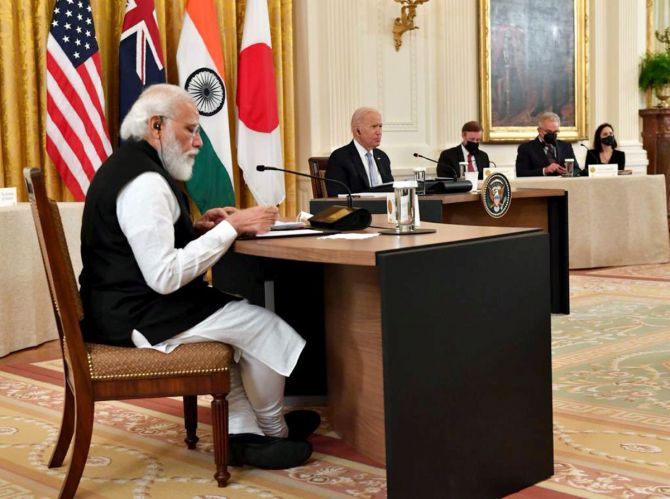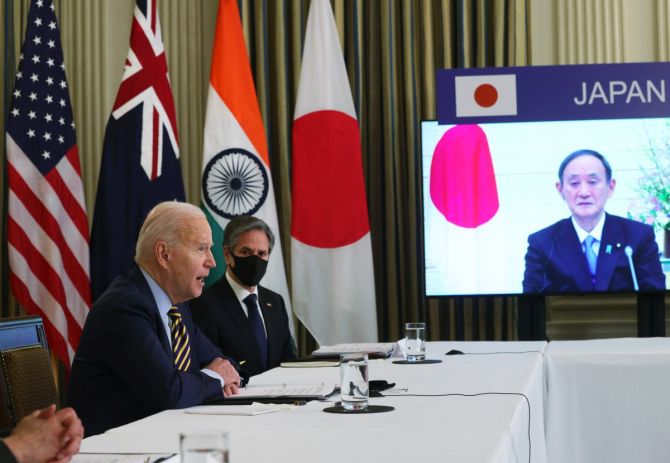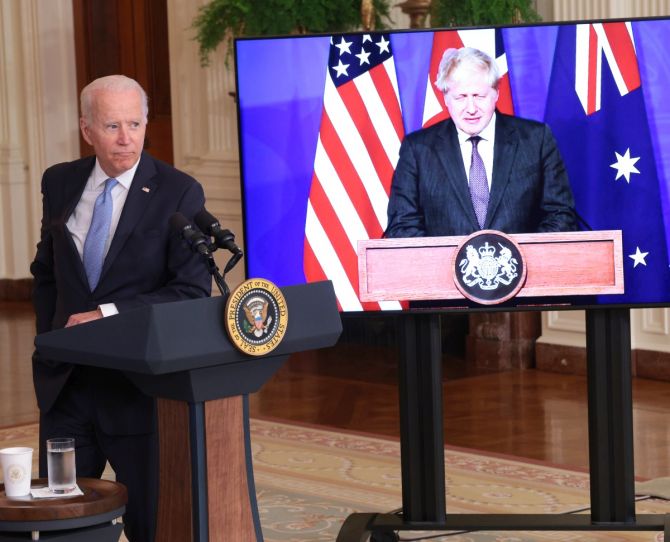More than India's alignment with the Quad, India's defence cooperation and partnership with the USA is of critical importance, notes Rup Narayan Das.

Just ahead of Prime Minister Modi's visit to the US, the launching of the Australia-United Kingdom-US -- AUKUS pact -- has given a new twist to the Quad and its strategic heft.
The question being asked will AUKUS supplement or supplant the toddler Quad which has just started walking after its stunted growth? The four-nation grouping has evolved through a process of fits and starts. It owes its origin to then Japanese prime minister Abe Shinzo's conception of 'confluence of seas'.
Initially joined by India, Japan and the USA, Australia was roped in in 2017.
Although its objective has been couched in strategic jargon to ensure an open and inclusive 'Indo-Pacific', its intent is to balance China's assertive behaviour in the Indo-Pacific including in the South China Sea.
China has scoffed at it as an 'Asian NATO' fraught with the revival of the Cold War.
India from the very beginning has adopted a studied response to the Quad.
While endorsing the Quad's objectives of open and inclusive Indo-Pacific and advocating freedom of navigation, it has avoided being seen as a defence and security strategy to contain China.
India's nuanced approach to the Indo-Pacific and its maritime strategy of the Quad can be deciphered from Prime Minister Modi's articulation at the Shangi-La dialogue in 2018, when he said, 'India does not see the Indo-Pacific as a strategy or as a club of limited members. Nor as a grouping that seeks to dominate. And by no means do we consider it as directed against any country.'
India's stance that it is not a party to the AUKUS nor that it is relevant to the Quad should be seen in the backdrop of India's calibrated engagement with China, more so at a time when the two countries are in a process of repairing the damage after the Galwam Valley incident.
Although a thaw is not on the horizon at the moment, India and China cannot afford to remain in adversarial relations indefinitely.
Geopolitics is always in flux and there is no guarantee that in the event of a confrontation between the two countries, any third country, including the US, will come to India's rescue.
So it is prudent to manage the relationship rather than provoke and precipitate the delicate relationship.
Foreign Minister Subrahmanyam Jaishankar, who understands China and its leaders including its Foreign Minister Wang Yi better than anyone else, is handling the delicate relationship impeccably despite all the headwinds.

While managing its complex relationship with its northern neighbour, India has always avoided and would like to avoid a confrontational stance, but simultaneously it would not succumb to China's one-upmanship, be at the Line of Actual Control or anywhere else.
India's response to the Galwan Valley incident was an eloquent testimony to India's firm resolve and the message was loud and clear to China.
Thus India's calibrated response to China and the Quad and now AUKUS has to be seen in this perspective.
India's challenge with China and the concomitant security dilemma with China lies more in the land frontier at the LAC rather than in the maritime arena, though it is no less a matter of security concern.
Not much is talked about the cyber security emanating from China. Banning Chinese apps and imposing restrictions on the import of Chinese telecom equipment suggest the cyber security threat emanating from China.

India's alignment with the USA has riled Beijing and it is a matter of strategic anxiety to it.
The defence cooperation with the USA and procurement of advanced weapons and equipment has certainly empowered India's defence capability.
India's current level of defence preparedness after having been neglected for years will certainly help face threats to its territorial integrity and sovereignty and deter the misadventure of its adversaries.
More than India's alignment with the Quad, India's defence cooperation and partnership with the USA is of critical importance.
The 2+2 dialogue between India and the USA is an excellent platform to share information and inputs for the all-around cooperation including security and defence cooperation between the two countries.
In fact, at a time when AUKUS is projected as a military alliance floated against China, it is better that India is not included in the grouping.
However, AUKUS should supplement and complement the Quad instead of supplanting it.
Although the Quad has downplayed the military dimension of the grouping, the Malabar naval exercise, which was held recently, cannot conceal its naval prowess particularly against the backdrop of China's assertive behaviour in the South China Sea and now also in the Indian Ocean Region.
It is not a coincidence that both India and Japan, who have a sort of adversarial relationship with China, are not included in the AUKUS. But in all likelihood the two entities will work in tandem and coordination, one reinforcing the other which will be a force multiplier.
Dr Rup Narayan Das, a China scholar, is currently a senior fellow at the Indian Council of Social Science Research at the Indian Institute of Public Administration, New Delhi. The views expressed in this column are personal.
Feature Presentation: Rajesh Alva/Rediff.com










